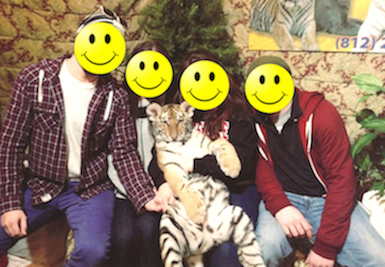You’ve seen them. Swiping on Tinder, popping up on your Facebook news feed, linked on Twitter, captioned “my walk on the wild side!”: tiger selfies. You’ve seen the pictures of your friends, your next boyfriend, your cousin, playing with a cute, cuddly baby tiger. But what’s the real cost of these tiger selfies? What is your donation supporting? What happens to these cubs after they’re too old to legally cuddle?
Wildlife In Need, Inc. is a non-profit organization located in Charlestown, IN. Its mission statement asserts that it is, “dedicated to the rehabilitation & release of indigenous wildlife & provision of permanent safe harbor to an array of exotic & endangered species.” It is known around Louisville for its unique opportunity to pet and play with tiger cubs as part of its “Tiger Baby Playtime.”
Tim Stark founded Wildlife In Need (WIN) in 1999, four or five years after he began rescuing small animals such as opossums and raccoons. The facility has 120 animals, two full-time employees and 25 volunteers.

Through a loophole in federal regulations, big cat cubs have a four-week span between the ages of eight and 12 weeks old when it is legal for the public to pet and interact with them. According to a report by Big Cat Rescue, the Humane Society of the U.S., the World Wildlife Fund and several other animal advocacy groups, the damage done to cubs through this exploitation is considerable.
By taking advantage of the services offered by WIN, people are unwittingly participating in irreversible harm to the animals. Cubs are taken from their mothers early and put into the arms of strangers, where constant handling disrupts their sleep cycles and their immune systems. On top of this, the age of cubs can be hard to determine, allowing those who exploit the cubs to make them available to the public past the four week limit. Ultimately, the practice of breeding cubs purely for four weeks of entertainment often leads to the cubs’ mishandling and exploitation for the rest of their lives.
According to a WIN spokesperson who asked to remain unnamed, many of the animals at WIN are “buy rescues.” These rescues pay former owners who no longer want their animals, but will not give them up without recouping some of their investment. WIN also purchases some animals from breeders, which are used as part of educational programs.

While the state of Indiana has few exotic animals regulations, Wildlife In Need is still obligated to meet U.S. Department of Agriculture guidelines. In its last inspection, the USDA cited WIN for numerous lapses in documenting where animals were coming from and being moved to. At the time of the inspection, one baboon, one black-capped Capuchin monkey, one white-handed Gibbon, two Patagonian Cavies, one guinea pig, one groundhog, three hybrid dogs, three ocelots, two servals, one African crested porcupine, one armadillo, three bobcats, three foxes and one hedgehog were present without any documentation of their provenance.
According to the USDA inspection report, there were records missing on the placement of two kinkajous and a minimum of four tigers. Additionally, disposition records were missing for two lemurs, one kangaroo, one tyra and two spotted leopard cubs — all of which have disappeared.

When asked about the missing animals, Stark said, “Animals come and go… And our paperwork was all screwed up at the time… It’s fixed now.”
WIN was additionally cited for forging the signature of a veterinarian and claiming that he was their on-call vet. According to a USDA inspection report, when the USDA inspector contacted the veterinarian, he claimed that he had not been to the property in two or three years and was not their vet.
This is not the first time that WIN has been scrutinized for its treatment of animals. In 2011, BBC released a documentary called America’s Most Dangerous Pets. In the program, host Louis Theroux visits Wildlife In Need and examines the animals and how they are handled by owner Tim Stark. You can view the documentary here (WIN’s segment begins around the 20-minute mark).
In the documentary, Stark talks about his tigers. “People say all the time, ‘you’re mixing bloodlines,’…I don’t know where these tigers come from. You know, I have no clue. I don’t care. When I have a baby tiger born here, you know what it is to me? It’s a damn baby tiger. You know, I don’t give a damn what they, you know …Siberian, Sumatran, Bengal… It’s a damn tiger. You know, 100 percent tiger, you know. I guarantee you that.”
In a call with Stark, he reaffirmed his beliefs on this, adding that tigers born in organizations like his are all considered generic, regardless of their parentage.

This practice and attitude reinforces animal-advocacy groups’ claim that businesses like this are not acting with the goal of conservation. “Generic” tigers, or those who are hybrids of different species, have little conservation value — they cannot help in saving one species from extinction. The breeding of these tigers is for the benefit of the breeder. Many of them end up dead, fueling a black market of tiger “derivatives” such as furs and tiger-bone wine.
A dead tiger is worth up to $50,000 for its parts. The breeding of generic tigers in the U.S. is not tracked, so there is no way of knowing how many are killed and sold off. According to the World Wildlife Fund, there are more tigers living in peoples’ backyards than there are left in the wild.
In addition to citations by the USDA, there have been complaints made to the Department of Agriculture, chronicling harsh conditions at WIN. In one USDA complaint filed in Aug. 2013, the witness writes that, “Several of the animals were very skinny and appeared malnourished. The cougar appeared extremely upset and growled and hissed at anyone that came near her cage …We observed a small group of foxes that appeared very hot, with no shade that were panting heavily. They also did not have any water available. Other than the cougar that was very upset, most of the animals were very lethargic.” The complaint also details small cages and a lack of clean drinking water, as well as a lack of trained staff.
Of these complaints, Stark replied, “Well, apparently she’s seeing something that thousands of other people aren’t [seeing].”

With so many citations, as well as complaints from those who have visited the site, why hasn’t Wildlife In Need been shut down by the USDA? The answer is not simple.
According to Susan Bass of Big Cat Rescue, “The USDA has only about 100 inspectors across the country with the profoundly difficult job of inspecting more than 2,700 animal facilities. When an inspector does arrive at a facility, he may see violations and cite the facility and request that the violations be fixed. But by the time the inspector is able to visit the facility again, months may have passed with nothing being fixed.”
Even if a USDA agent is able to shut down a facility, it is very easy for friends or family members to apply for their own permit and keep the place going.
WIN is currently closed for renovations. According to WIN, it is investing $250,000 into the building of new cages and other facilities for the animals. Stark was not able to give an estimated time frame for a reopening. Currently, WIN is running two fundraisers, one of them Tiger Baby Playtime. Playing with the tigers requires a donation. The event description asks visitors to “Bring your cameras because photos will be a welcome part of this hands-on experience. Have a tiger posed in your arms for $20.00 cash with as many people as you want per sitting.”
Wildlife In Need, Inc. is just one of over 33 organizations across the country that regularly advertise services that exploit wild animals in this manner.
There is now a bill pending in Congress, The Big Cats and Public Safety Protection (HR 1998, S 1381), which would end the purchase of big cats in the U.S. and criminalize their public exploitation. To take action or find more information, click here.
Photos: Courtesy of the Facebook page of Wildlife In Need
Cover Photo: Courtesy of Shutterstock/Aleksey Klints



